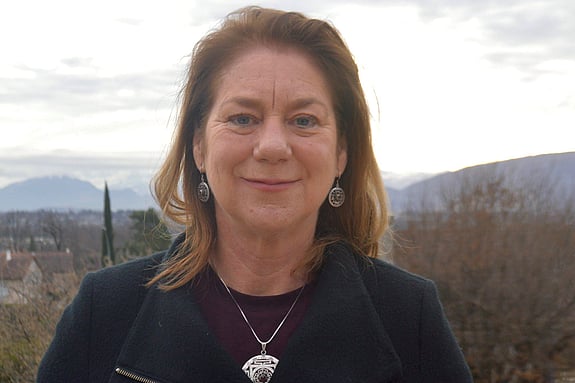"Mixed gender teams and leadership outperform gender-homogenous teams in terms of stability, adaptability and efficiency.”
Fiona Terry has been working in the humanitarian sector for over 30 years and is currently the Head of the ICRC’s Centre for Operational Research and Experience (CORE), based in Geneva. Her years of field experience in contexts like Iraq, Liberia, Myanmar, Rwanda and Somalia feed into her research as she works on the ethics of humanitarian action and on how to promote compliance with International Humanitarian Law among armed forces and armed groups.

“I first saw the actions of the ICRC and National Societies in Northern Iraq and Somalia and was impressed by the professionalism and dedication of staff and volunteers, and their commitment to humanitarian principles. It was – and still is - quite striking that the Somali Red Crescent has managed to ensure that anyone regardless of their clan has access to Keysaney Hospital in Mogadishu despite the armed conflict between clans. I applied to the ICRC after leaving Somalia but was told I had to apply through the Australian Red Cross – the rules at that time. After several intensely rich field assignments with Médecins Sans Frontières (MSF) and doctoral studies through which I tried to make sense of the ethical challenges humanitarians face trying to do more good than harm in highly political contexts, I was accepted into the ICRC in 2003 and assigned to the operation in Myanmar.
My doctoral studies exploring the moral responsibilities of aid organizations for the consequences of their actions became the bridge between the roles of practitioner and academic. My thesis was published by Cornell University Press in 2002 as Condemned to Repeat? The Paradox of Humanitarian Action and the questions it raised are still those that haunt humanitarians today. It is important when conducting research and making recommendations to have a sense of the constraints and challenges that humanitarians face which is only possible if having tried to resolve them yourself.
”It is important that we aim for equity : women often bring different perspectives to a problem from that of men. ”
Being a woman in the humanitarian sector comes with pros and cons, depending on the context in which you work. In Afghanistan, for instance, being a woman was an advantage because I was treated as an ‘honorary man’ when talking to the men, and then could meet with Afghan women behind the closed doors of their houses. My male colleagues could not meet with the women, and to hear their perspectives was so important to our work. I also found that I was sometimes spared some of the harsher statements to which my male colleagues were subjected – my interpreter told me after a tense meeting with some Somali elders that some statements were not shared with me because ‘I could have been their daughter’. But one of the cons of being a woman is vulnerability to sexual violence – in Liberia I spent hours convincing the head of a local armed group that I could not become his wife for the evening. It was very scary. As for my international colleagues, I have not felt discriminated against or disparaged because I was a woman – but I also cannot say that I hit a glass ceiling, because I have not sought high executive positions, preferring substance over process.
I think that positive discrimination has been a double-edged sword for women. It is important that we aim for equity and sometimes this requires creating conditions conducive to attracting women into positions of responsibility and permitting a better life balance between work and family. But it is not without some backlash: I have heard on several occasions that ‘she only got the job because she is a woman’ with little consideration given to her skills or experience. This is tough to overcome – we still have a long way to go to reach gender equity, but big strides have been made.
”Being a humanitarian is both an immense privilege and confronting to see so much suffering in the world. Combining this vocation with having a family is not easy.”
Although progress has been made in sharing duties and responsibilities between parents, the reality is that humanitarian operations are intense and invariably one parent must take the back seat. I know a few couples who alternate between taking the lead from one assignment to the next, but more often it is the woman who puts her active engagement on hold to have a family. This was my case when my children were 5 and 2 and we moved to Sudan for my partner to head the ICRC’s operations there: we could not both work at the pace necessary and ensure the wellbeing of the children and so I stepped back. It was hard at first, but I was fortunate to pick up part-time consultancy work through which I remained engaged. It is not an easy balance to maintain.
Regarding the Red Cross and Red Crescent Movement and the future of humanitarian action: I hope both continue to thrive. I’d love to see better cohesion in the Movement, with all components working genuinely for the betterment of humanity. I think National Societies have the most incredible potential. We should all strive to apply the Fundamental Principles that are so vital to being able to assist populations caught up in armed conflict, working together for the common cause."
